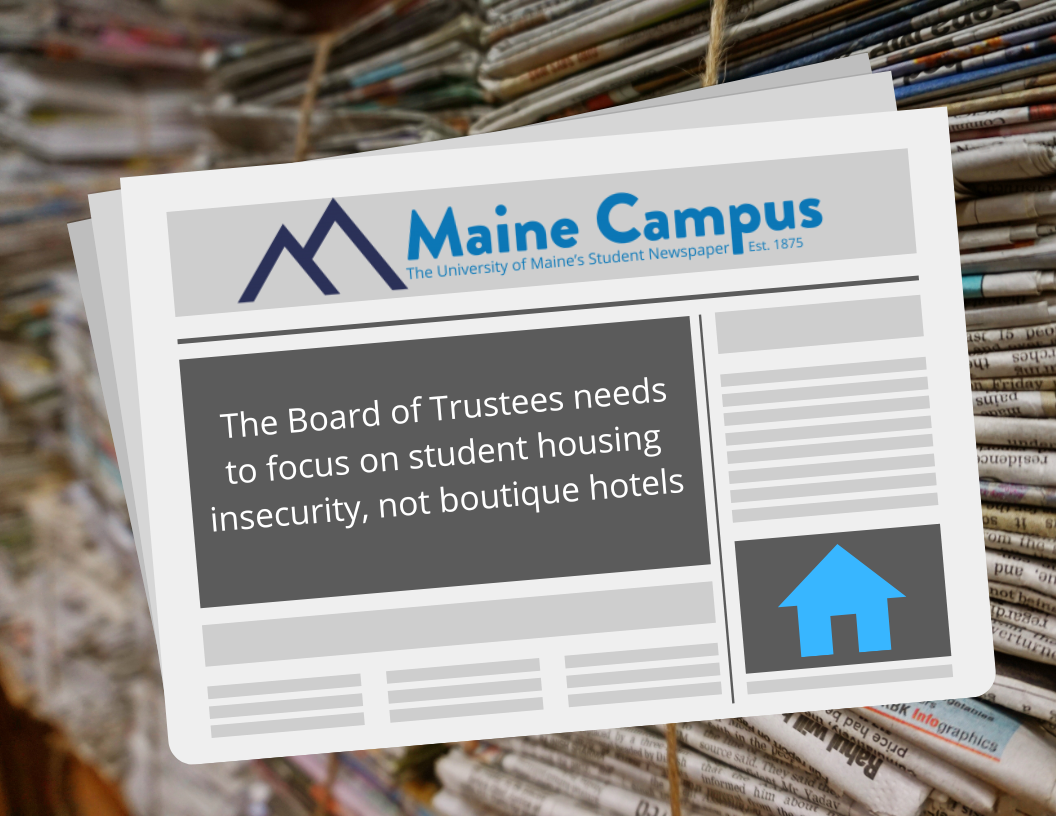Students sleeping in the Union and their cars, dining halls functioning at low capacity and students going hungry: it sounds like the start to a University of Maine disaster film but it’s a tragic reality. While spring break for many students meant trips to Florida, for some it meant a week of brutal survival.
On-campus students who were unable to leave campus the Friday before spring break had to sleep on the floor and couches of the Union. That Friday evening was a rare glimpse into the typically unseen housing insecurity epidemic that students at the University of Maine face. 60% of college students face housing insecurity at some point during their undergraduate years. 14% of students are homeless. This issue hits non-white and queer students the hardest. Over 40% of unhoused youth identify as queer, and over 30% are Black.
Housing insecurity can be debilitating. The toll on student’s mental health can tank their GPA, their social life and create long-term health issues. This drives students into UMaine’s flawed academic probation system.
The damage of UMaine’s housing strategy goes well beyond the mental though. Room and Board at UMaine costs $11,856. Subtracting out the cost of one of the most common meal plans ($2,730), the price for housing for a semester lands at around $9,126 for seven to eight months of housing. That means the per month rent an on-student pays is $1,140-1,300, significantly higher than the rent most off-campus students pay. For that price, a student could rent a 4 bedroom house in Orono all to themselves.
For this outrageous price, students get a single, shared room that serves as their living room, bedroom, kitchen and study space. Walls are thin, beds are small and the bathrooms can often be a nightmare. Students who move out of their residence hall after the semester begins can face over $500 in fees.
Dorm prices at four-year public universities have shot up 111% in the past 30 years, becoming a major revenue stream for universities. By making on-campus housing mandatory for first-year students, universities like UMaine keep a stranglehold on that revenue. This is nothing short of predatory price gouging targeting a vulnerable group of students who have no choice but to pay the price.
Information on student housing is hard to find. Many students do not know that only three dorms on campus offer overbreak housing for Winter and Spring Break housing. While this information is not particularly useful if a student’s housing situation changes during the semester, it should not be buried on the Housing Services FAQ page under questions like “What if I’m 6’4” or taller?” It may startle many students to learn housing is not even guaranteed for first-year students on this campus.
Making matters worse, UMaine is getting involved in the boutique hotel business. Colburn and Holmes Hall will be converted to hotel space in a shared investment between UMaine and Radnor Public Realty Group LLC. UMaine will be leasing the buildings to Radnor and could be on the hook for up to $2 million of the $17.2 million dollar investment, despite the fact it only anticipates making a $30,000 yearly profit off of the hotels.
This means the hotels, which will be built through the renovation of historical buildings (something UMaine has not handled well in the past), will take two thirds of their 99 year lease to Radnor to break even. While students stress about whether they have enough blankets to survive sleeping in their car over winter break, they can rest assured UMaine will be squeezing a marginal profit out of their new hotels.
UMaine is in no position to be leasing off space on this campus when there are students facing insecure housing. That $2 million dollars should be put toward the student needs for food and housing, not the University’s need to raise its profile. UMaine students are being driven into debt and sleeping on the floor of the Union while the Board of Trustees forgets their responsibility as leaders of a public university.
If UMaine is to build these boutique hotels on campus, they should be opened to unhoused students during breaks. Furthermore, UMaine must expand their overbreak housing capacity and dramatically increase the publiciziation of the existing resources. Providing direct financial support and housing options to students is a bare necessity this university must offer before allocating funds for luxury items like a hotel. That’s not just basic economics: that’s common decency.




